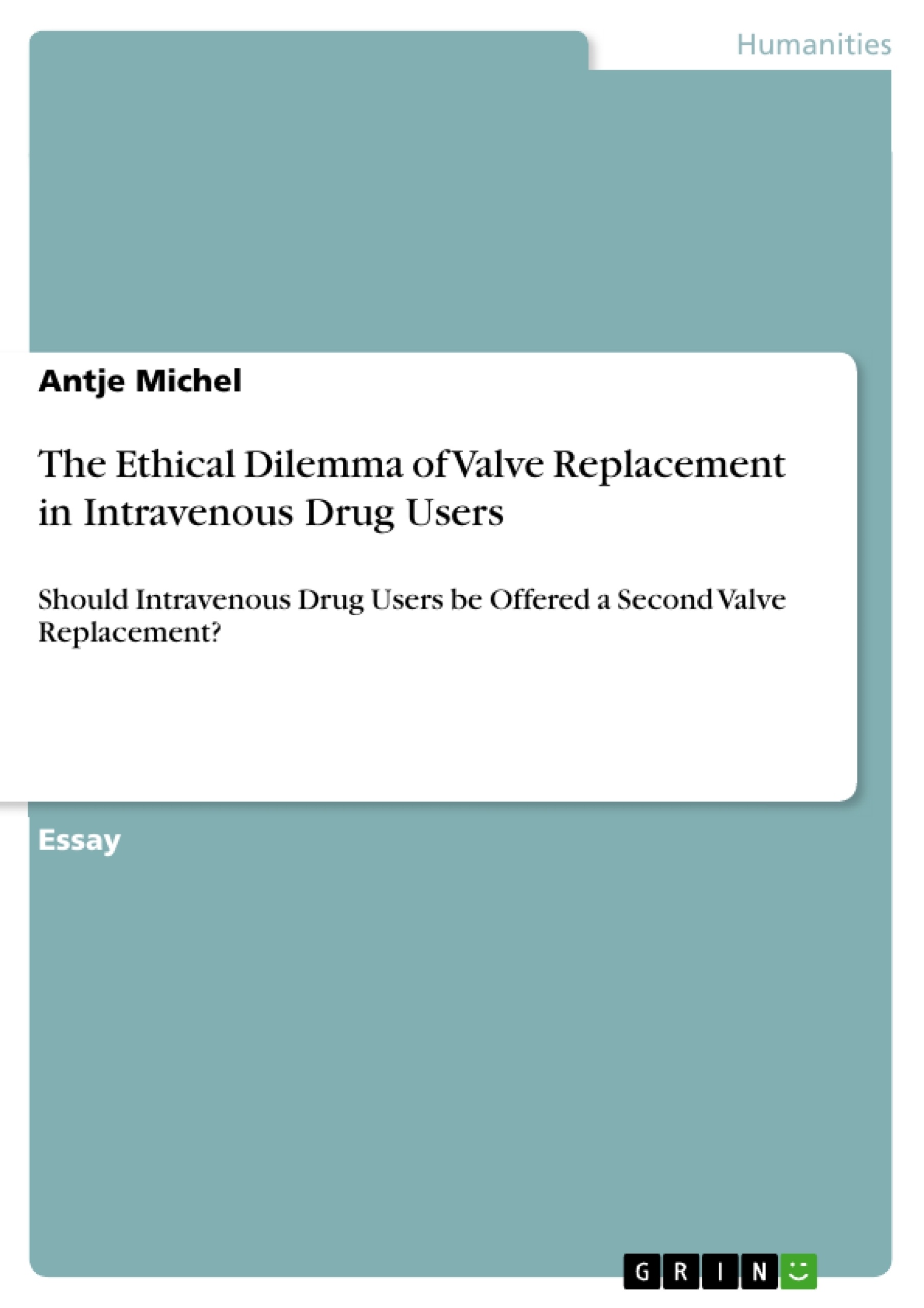Infective endocarditis (IE), brought on by introduction of pathogens into the bloodstream, is a serious, potentially lethal condition affecting approximately 12.7 out of 100,000 individuals annually. Complications of IE include stroke, organ damage, secondary infections, heart failure, and almost certain death if infected valves are not replaced and/or aggressively treated with antibiotics. A significant risk factor for IE is intravenous drug abuse. Some individuals respond well to aggressive antibiotic therapy; however, others require early or even emergent surgery. Recurrent IE is common in intravenous drug abusers (IVDAs). This paper addresses the ethical dilemma associated with repetitive valve replacements in patients who use injection drugs.
Inhaltsverzeichnis (Table of Contents)
- The Ethical Dilemma of Valve Replacement in Intravenous Drug Users
- Ethical Obligations in Todays' Healthcare System
- Conclusion
Zielsetzung und Themenschwerpunkte (Objectives and Key Themes)
This paper explores the ethical complexities surrounding repeated valve replacement surgeries in intravenous drug users (IVDAs) who experience recurrent infective endocarditis (IE). It examines the arguments for and against denying these individuals a second, third, or even fourth valve replacement, considering factors such as the burden on society, the healthcare team, and the likelihood of a negative outcome.
- Ethical considerations in providing repeated valve replacement surgeries to IVDAs
- The role of addiction as a contributing factor to IE and the need for comprehensive treatment plans
- The potential futility of valve replacement surgeries without addressing underlying drug addiction
- The allocation of healthcare resources and the ethical implications of denying treatment
- The impact of IV drug abuse on society and the healthcare system
Zusammenfassung der Kapitel (Chapter Summaries)
- The Ethical Dilemma of Valve Replacement in Intravenous Drug Users: This section introduces the ethical dilemma of repeated valve replacement surgeries for IVDAs. It highlights the high risk of IE in this population and the potential for recurrent infections after surgery. The author presents a hypothetical case study to illustrate the common scenario of a patient needing multiple valve replacements due to continued drug use.
- Ethical Obligations in Todays' Healthcare System: This section explores the counter-argument to denying valve replacements for IVDAs, emphasizing the importance of considering drug addiction as a disease. The author argues that comprehensive treatment plans, including mental health services and rehabilitation options, should be offered to these patients. The ethical obligation of medical professionals to treat medical emergencies, regardless of the cause, is highlighted.
Schlüsselwörter (Keywords)
Infective endocarditis, intravenous drug abuse, valve replacement, ethical dilemma, addiction, healthcare resources, utilitarian approach, comprehensive treatment, rehabilitation, medical emergencies, Hippocratic Oath.
Frequently Asked Questions
What is Infective Endocarditis (IE)?
IE is a serious infection of the heart valves caused by pathogens entering the bloodstream, which can lead to heart failure, stroke, or death if untreated.
Why is valve replacement ethically controversial for IV drug users?
The ethical dilemma arises when patients continue intravenous drug use after surgery, leading to recurrent infections and the need for multiple, high-risk, and costly surgeries.
What is the "utilitarian approach" mentioned in the paper?
This approach considers the allocation of scarce healthcare resources and may argue against repeated surgeries if the likelihood of a positive long-term outcome is very low.
Should addiction be treated as a disease in this medical context?
The paper argues that medical professionals have an obligation to view addiction as a chronic disease and provide comprehensive treatment, including rehabilitation, alongside surgery.
What does the Hippocratic Oath imply for these patients?
It emphasizes the ethical obligation to treat medical emergencies and alleviate suffering regardless of the patient's lifestyle or the cause of the illness.
What happens if an infected heart valve is not replaced?
Without surgical intervention or aggressive antibiotics, severe infective endocarditis is almost always fatal due to heart failure or systemic organ damage.
- Arbeit zitieren
- Antje Michel (Autor:in), 2015, The Ethical Dilemma of Valve Replacement in Intravenous Drug Users, München, GRIN Verlag, https://www.grin.com/document/303792



